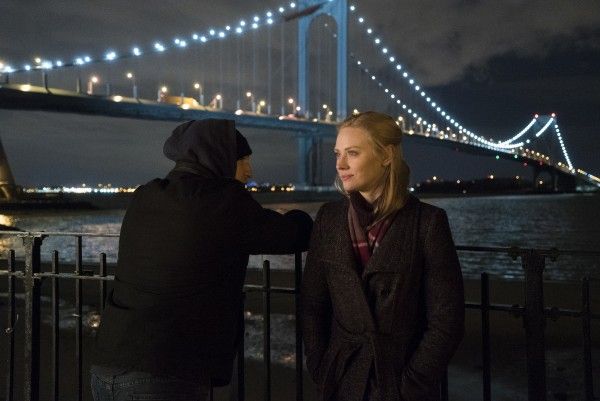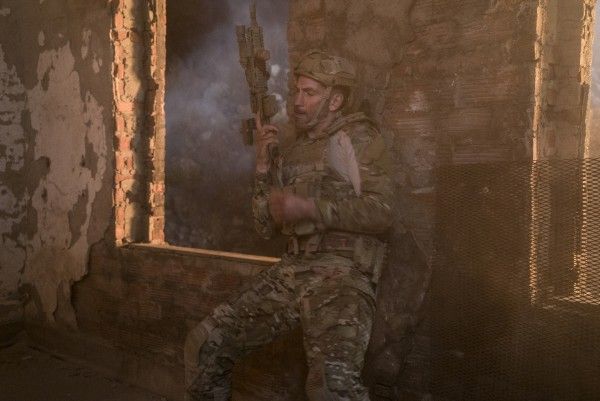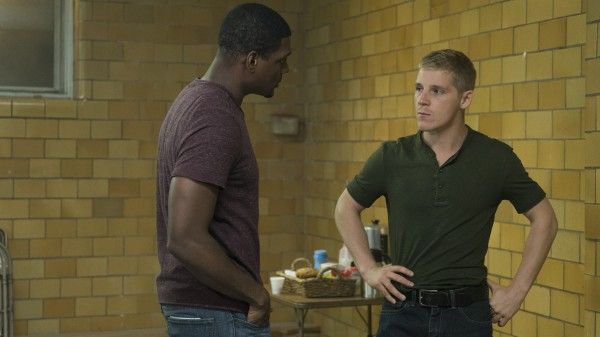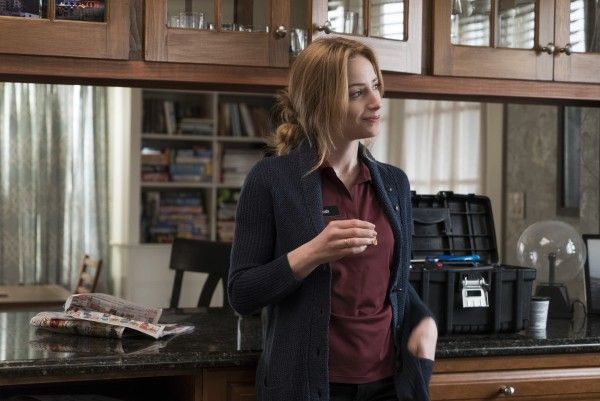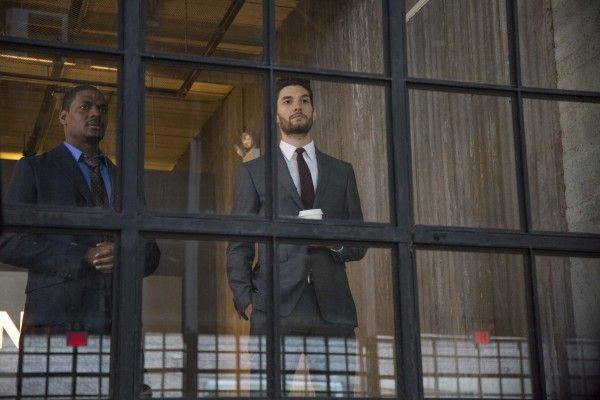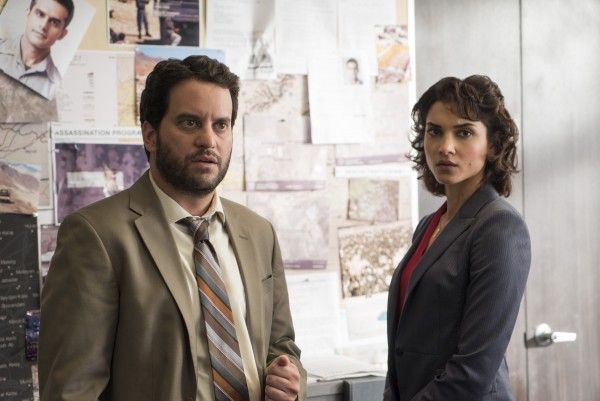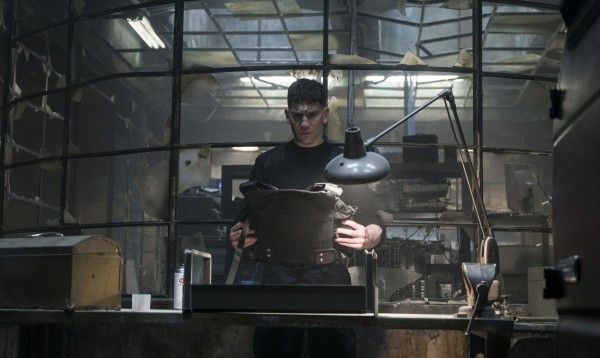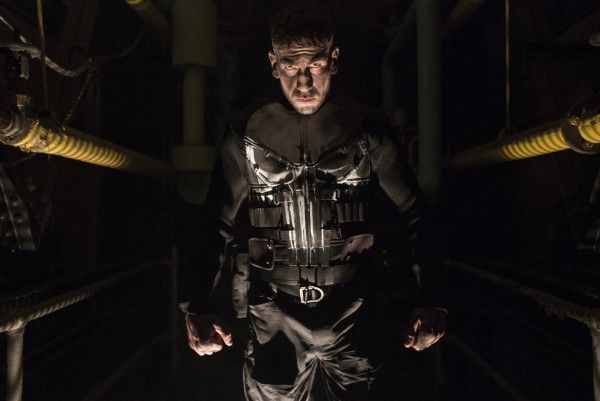The Frank Castle we met in Daredevil's excellent second season was a force of nature. Driven to slaughter en masse in the aftermath of the massacring of his wife and two children, Castle was the uncomplicated messenger of death that worked against and in tandem with Charlie Cox's crimson crusader, an embodiment of the thorny philosophical heart of justice without violence or murder. One could even have read the entire season as a recitation on the increasing moralization of killing in the name of peace, whether it be the inner type or the global sort.
That's how I read it anyway. That being said, this wouldn't quite account for how soulful Castle came off as by the bombastic end of the series. The writing in Daredevil continues to be suspiciously undervalued, but the undeniable core of Castle's humanity and elusive vulnerability is Jon Bernthal. Coming off of a fantastic run on The Walking Dead and remarkable supporting turns in The Wolf of Wall Street and Sicario, Bernthal grounded the character as a victim of trauma who was easily pushed toward violent alienation. fueled by intense military training, extensive experience as a tactical professional killer, and a bestial rage. And yet, when teased out by the man he calls "Red" or Deborah Ann Woll's Karen Page, what was most notable about Castle is that soulfulness, summoned when he allows himself to be open and vulnerable with people he might otherwise call his other.
Page shows up early on in The Punisher, Netflix's series-long exploration of Castle's life in the aftermath of his altercations with Matt Murdock, and Woll is essentially used here exclusively for plot. That's meant twofold. At first, this is meant in the sense that she gives Castle information on an enigmatic hacker, the man we come to know as Micro (Girls' Ebon Moss-Bachrach), known as Microchip in the comics and in the truly ludicrous Punisher: War Zone, played by Wayne Knight. However, she's also used to continue the pestering charade of narrative universes, which stresses a dull obsession with linear time in narratives that openly involve beings that can bend and reshape that very thing at their impulsive will.
It's a minor quibble but one that nevertheless speaks to the frustrating yet ultimately worthwhile experience of sitting through the first six episodes of The Punisher. Though Castle is not super-heroic in the same sense as Jessica Jones, their shows share a specific focus on the struggle for rehabilitation after immense trauma. Where Jessica Jones inferred a focus on sexual assault and psychological control, The Punisher deals in the mental aftershocks of warfare and illegal operations in the name of national security. The bedrock of the narrative is formed amongst a group of veterans, including Castle and Ben Barnes' Billy Russo, Castle's best friend, and much of its narrative centers on how these men deal with what they did and saw in the Iraq and Afghanistan wars.
This is incredibly serious material, and it's a testament to the ambition of The Punisher that the show's creator, Steve Lightfoot, does not shy away from the isolationism and inner torment that veterans live with on a daily basis. One soldier that attends the same discussion group that Castle drops in on, run by fellow soldier Curtis Hoyle (Jason R. Moore), is found digging a ditch in his backyard in the hopes that it will help cure his anxiety and insomnia. Another, much older veteran talks cynically about a careless government and the need for an armed uprising. Stolen valor and high-end private security firms also factor into the narrative along the way. The series is nothing if not timely, and when the focus is on these matters, The Punisher is more challenging and captivating than anything the MCU or Marvel TV programs have produced thus far.
When the series moves away from this stuff, however, the show ranges from fascinating to bland to ridiculous. The creative team spends an abundant amount of time setting up the relationship between Castle and Micro, who end up hold-up together in the latter's secret lair while they figure out why Castle's family was killed and why Micro, who leaked government secrets in his job with the NSA, was marked for death as well. Both performers lend gallows humor and intimacy to the dialogue but their bonding takes the better part of two episodes before it's set in cement. Meanwhile, there's a subplot involving a newly crowned honcho at the Department of Homeland Security, Dinah Madani (Amber Rose Revah), that is utilized primarily to deliver backstory. There's a sense that Lightfoot and his crew are trying to depict her as another kind of outsider -- the formidable female investigator in the boy's club -- in the same mold as Castle, but we're never invited to know much about her beyond her title at DHS.
This is a result of having a little too much on your plate, to say nothing of the laborious, intermittent setting-up of a looming narrative arc rather than focusing on what's immediately important to these characters and what they're going through. These ambitions are healthy, however, and as the episodes go on, the series reveals itself to be a genuine heartbreaker. Castle doesn't trust people who haven't seen horror and loss the way he has, and he doesn't trust himself around them either. It's why he takes so quickly to Micro's wife, Sarah (Jaime Ray Newman), who believes herself to be a widow, and it's why he's so prickly around Micro at first. He has submerged himself so deeply in grief, loss, fury, and guilt that he simply cannot connect with those who are not infected by those same things.
No spoilers here, but by the time we get to the sixth episode, you get a full sense of just how vulnerable Castle is when he's around people he trusts, and how easily exploitable he is under the right circumstances. This is where a great deal of the show's tension and thrill comes from but there's also the basic pleasures of a good old fashioned row, such as the one between Castle and one of Madani's colleagues (and those who have read the source material by Gerry Conway and John Romita Sr. will know where things with Russo are heading). When these two elements are in alignment, The Punisher is riveting, politically adventurous entertainment, willing to get mired in the complexity of a nation that has come to define itself through the incalculable damage and untold amounts of killings done in the name of peace. When the need to set-up, reiterate, or preempt the plot becomes its more prominent concern, however, it's emblematic of everything wrong with comic-book adaptations, on TV or elsewhere.
Rating: ★★★ Good — Proceed with cautious optimism
The Punisher premieres in full on Netflix starting Friday, November 17th.


